A prescription for danger
Updated: 2013-11-04 07:47
By Yang Wanli, Peng Yining and Tang Yue (China Daily)
|
||||||||
Frontline medical staff at risk of being attacked and even killed by patients, report Yang Wanli, Peng Yining and Tang Yue in Beijing.
Doctor Wang Yunjie died in the hospital where he had worked for 23 years, the latest victim in a spate of violent attacks on medical workers.
The 49-year-old died on Oct 25 after being attacked by a patient who was unhappy with the result of an operation Wang had performed on his nose. The patient stabbed Wang with a 30-centimeter knife, causing severe chest injuries. Two other doctors were also badly injured in the attack in Wenling, Zhejiang province.
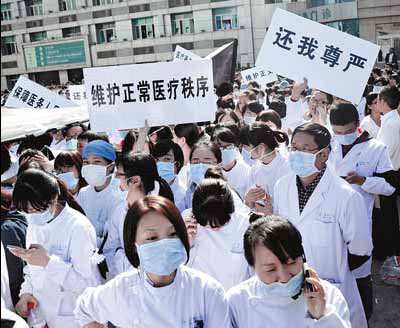 |
|
Medical workers protest at the hospital where doctor Wang Yunjie was killed by one of his patients on Oct 25, in Wenling, Zhejiang province. Jin Yunguo / for China Daily |
Attacks on medical workers occur every two weeks on average, according to the China Hospital Association. There have been six serious attacks in the last two weeks alone.
The association said 27.3 percent of hospital doctors were assaulted in 2012, a rise from 20 percent in 2008. Seven doctors died as a result of attacks by patients or their relatives last year.
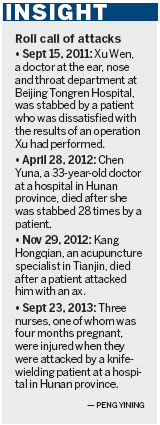
Workers in the ear, nose and throat department where Wang worked called a strike in response to their colleague's killing. The incident also triggered nationwide protests by medical professionals, who called for greater protection and increased security.
However, while the general public's reaction was one of shock, a minority of comments struck a discordant note.
"I've heard that some onlookers said it was a pity that only one doctor died," said a physician in Wenling, who declined to be named.
Local newspaper also reported that patients had complained about the strike in Wang's department, saying that it was unreasonable for the doctors to walk off the job because one of their members had been murdered at work.
"The doctor who died, and the ones who were injured were, unfortunately, those who behaved well. They were whipping boys," said a physician in Hangzhou, the capital city of Zhejiang. The physician, who spoke on condition of anonymity, had met Wang professionally a number of times. "He was very careful and responsible, and had a good attitude. When we discussed a case, he always remembered even the smallest details," he said.
Wenling No 1 Hospital was well known 40 years ago. In the 1960s, many of its physicians were college graduates from reputable medical schools in Hangzhou and Shanghai. At that time, few medical graduates held a master's and those who did were usually the top of their profession.
However, the hospital's reputation began to slide in the 1980s, according to a doctor who grew up in Wenling and now works at a hospital in Hangzhou. Like Wang, he graduated from Zhejiang Medical University, one of China's best medical schools. Like his colleagues, he declined to give his name.
He said he wanted to return to his hometown after graduation, but obtaining a good position at Wenling No 1 Hospital depended not on professional skills but social skills, networking and presenting gifts to key figures in the administration.
In November 2008, Cai Xiafang, former assistant to the hospital's president, was sentenced to 11 years in prison for accepting bribes totaling 280,000 yuan ($46,000). A year later, his boss, Li Feng, was sentenced to 13 years after being found guilty of accepting bribes totaling 500,000 yuan.
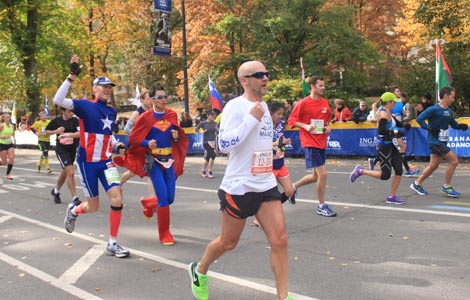
 New York City Marathon concludes in chills
New York City Marathon concludes in chills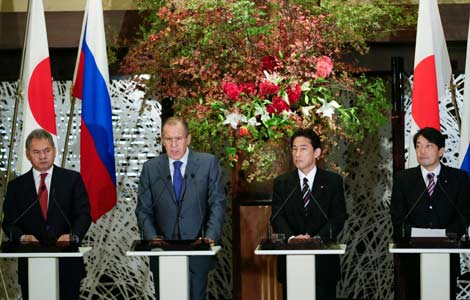
 Japan's policies questioned
Japan's policies questioned
 Transit policy a hit in Guangzhou
Transit policy a hit in Guangzhou
 Reform roadmap before key meeting
Reform roadmap before key meeting
 Kenya enhances security as tourists flock to see eclipse
Kenya enhances security as tourists flock to see eclipse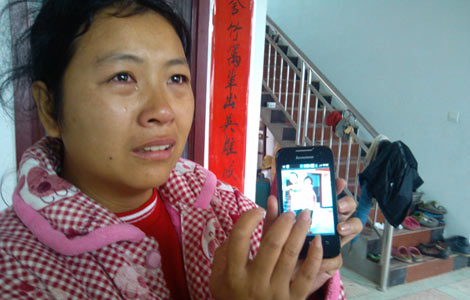
 Man confesses to killing 3 children: authorities
Man confesses to killing 3 children: authorities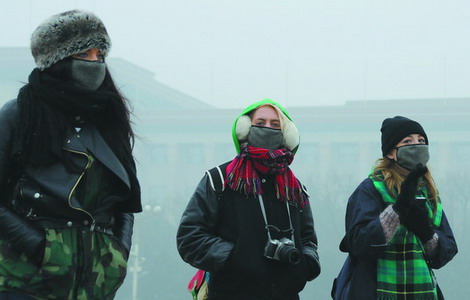
 Run away from Beijing's gray skies
Run away from Beijing's gray skies
 LA airport shooting suspect charged with murder
LA airport shooting suspect charged with murder
Most Viewed
Editor's Picks

|

|

|

|

|

|
Today's Top News
Cross-Straits progress discussed
Progress in SARS study
How China can avoid an “economic hard landing”
3-D scanners and waves: Innovation in spotlight
Kerry: US won't allow attacks on Mideast allies
Beijing plans to ratchet up promotion of visa-free stays
Premier Li seeks point of balance
Reform roadmap before key meeting
US Weekly

|

|







